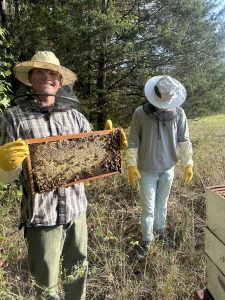
On any given pollen-hazed afternoon, University of Mississippi Beekeepers President Quinn Mäensivu and his team can be found following the aroma of honey across the rolling hills of the UM Field Station in pursuit of bees.
Upon arriving at the apiary, the beekeepers are greeted by the sound of buzzing as the insects begin to seep out of the hive, attempting to bombard the newcomers with stings.
“When bees sense danger, they release a pheromone called isopentyl acetate,” Mäensivu said. “This chemical goes through the air and lets other bees know to be ready to attack.”
Donned in layers of clothing and sheer veils to protect their skin, faces and necks, the beekeepers open the hive and use a smoker to mask the pheromone released by the honeybees. With the bees at ease, the keepers are able to safely assess the health of the hive to ensure they are able to effectively pollinate.
UM Beekeepers care for the Lafayette County beehives to serve in part the larger mission of protecting the brightly-striped insects that support the world’s ecological and agricultural systems.
“Bees and other pollinators help produce a third of our food supply and help provide us with a sense of food security,” Mäensivu said.
Under the leadership of senior business major Mäensivu, UM Beekeepers allows students the opportunity for hands-on involvement in the study and care of bees.
Recognized for his dedication to rekindling UM Beekeepers after its inactivity, Mäensivu was elected president at the organization’s first meeting last year. Since then, he has worked with Assistant Professor of Environmental Toxicology and Assistant Research Professor in the Research Institute of Pharmaceutical Sciences Courtney Roper to create a collective of students that share an interest in working with bees and bettering the environment.
The Winter Park, Fla. native is not only a bee enthusiast, but he also serves as president of the Ole Miss Wakeboarding Club, an ambassador for Lead Abroad and a member of the Mississippi National Guard.
Although the beekeepers enjoy regularly engaging with the bees in their habitat, the bees’ comfort remains as a priority for the organization.
“Bees do not like to be bothered too much,” Mäensivu said. “We are making it a point to check on them weekly right now with aspirations to limit that down to once every two weeks.”
Aside from beekeeping, Mäensivu and his fellow apiarists host speakers and tabling events as well as visit local beehives.
With a sharp decline in pollinator populations, Mäensivu expressed the importance of bees in creating a healthy environment.
“Almost 90 percent of wild flowering plant species rely on pollinators to reproduce,” Mäensivu said. “Bees play such an important role in our ecosystem, but bee populations continue to decline due to the use of pesticides and other environmental factors.”
More about UM Beekeepers can be found on their Instagram and the ForUM.



























